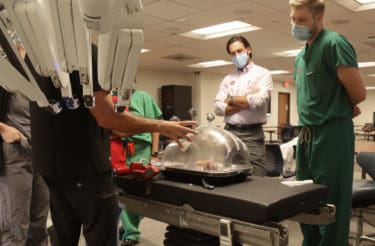By Amy Widner
Robotic surgery is emerging as the future of general surgery, which means UAMS general surgery residents are eager to master those skills today.
“Robotic surgeries are relatively new in the world of general surgery, but we can already see how important it is to patient outcomes and how it can be used for multiple applications,” said John Pagteilan, M.D., general surgery chief resident at UAMS. “We learn about it at our conferences, we see the data that’s coming out, and we know it’s the future. As physicians that are stepping into that future, we have to be ready.”
The unfortunate reality of residency, however, is that often the trainees don’t get the chance to practice new skills with new equipment as much as they’d like, especially if the technology is expensive and in high demand for surgical use.

W. Conan Mustain, M.D., assistant professor of surgery in the Division of Colorectal Surgery in the UAMS College of Medicine, is hoping to change that. He recently partnered with general surgeons from the Central Arkansas Veterans Healthcare System – Theresa McCallie, M.D., and Kim Jackman, M.D. – to offer a Robotic Surgery Skills Lab for general surgery residents.
The residents had two days of hands-on time with a mobile unit of the Da Vinci Xi Surgical System, which UAMS purchased in January 2020, under the helpful eye of the surgeons and a representative from the company who gave them a detailed tutorial. In addition, the residents will complete online training modules on their own time and have access to simulation exercises they can practice on UAMS’ Da Vinci Xi when it’s not in use.
“They will follow a dedicated Robotic Surgery Curriculum, designed by McCallie, Jackman and myself, gaining graduated autonomy and increased complexity of procedures throughout their residency, with the goal of being competent robotic surgeons upon completion of their training,” Mustain said. “Today’s training is just the beginning. We hope that after they’ve learned the basics, we can offer more advanced material where they can practice specific operations.”

UAMS has been offering robotic surgeries for more than a decade, but mostly in urology; obstetrics and gynecology; and ear, nose and throat surgery. Robotic surgery has several advantages over conventional laparoscopic surgery. The binocular camera provides 3D images with better depth perception, and the surgeon has more realistic control of the robotic instruments through handles that mimic the 360-movement of human wrists, rather than the up-down/left-right movements of conventional laparoscopy.
The Da Vinci Xi is the “next generation” in robotic technology and expands the types of procedures that can be done robotically. Previous models had to be positioned in one area and were difficult to move. Many operations like hernia repair and colorectal resections require more freedom to move around the body, which the Da Vinci Xi allows. Additionally, the Xi model is equipped with technology that allows sealing and stapling of major blood vessels and organs.

“Over the last five years, general surgery is the fastest growing segment of robotic surgery, particularly in the areas of colorectal surgery, hernia repair and bariatric surgery,” Mustain said. “Surgeons are really discovering that the added stability and ability to suture realistically are advantageous. Medical students and residents are on top of this. A recent study showed that 80% of graduating medical students going into surgery said that training in robotics was important for where they choose to go for residency.
“Most of the practicing general surgeons who have graduated from UAMS in the last five years are now using robotics in their practices, many right here in Arkansas,” Mustain said. “They had to learn completely on their own after training.”

Mustain and fellow UAMS colorectal surgeon Jonathan A. Laryea, M.D., have adopted robotics into their practices, so they felt it was important for the residents to be prepared to do so as well.
“This is just one example of the work we do to ensure our residents complete the program ready to not only keep up with their peers in general surgery, but be at the forefront of emerging technologies,” Mustain said. “The future of the field will be in their hands. It’s our job to ensure that future starts now.”
Pagteilan agreed.
“Today in medicine, whatever is new quickly becomes the norm,” Pagteilan said. “It’s not something that we can ignore. We have to pursue it for the betterment of our patients.”
